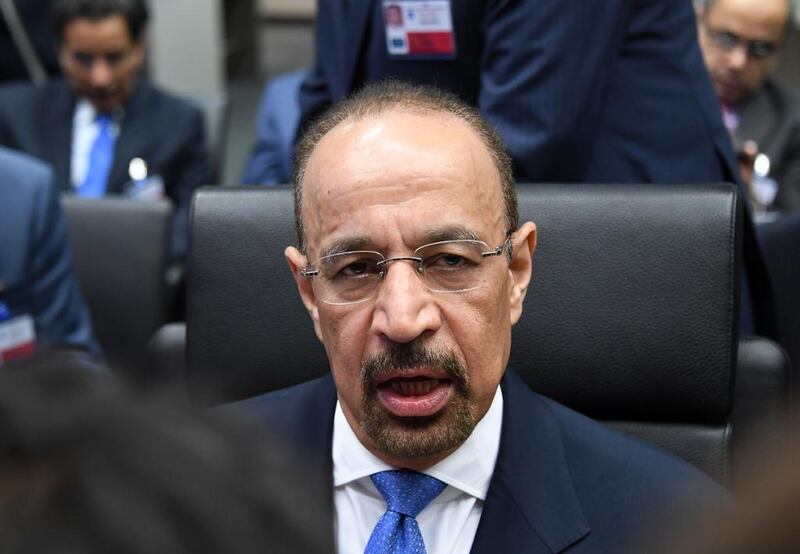Algeria's oil minister, who is hosting an informal meeting of Opec ministers in Algiers the week after next, sent conflicting signals after diplomatic efforts over the weekend to try to drum up support for an agreement on concerted oil market action.
Noureddine Boutarfa has been trying to reconcile the desire for action among many Opec and non-Opec countries suffering from reduced oil prices, with the reluctance of the few countries in a position to take that action.
Mr Boutarfa met Mohammad Barkindo, the Opec secretary general, and Saudi Arabia’s oil minister, Khalid Al Falih, on Friday in Paris, and Russia’s oil minister, Alexander Novak, later in Moscow.
Mr Barkindo held talks early last week in Tehran with the oil minister Bijan Zanganeh, who voiced support for efforts to stabilise oil prices but declined to commit Iran to these efforts until it has reached production levels of 4 million barrels per day (bpd), which prevailed before nuclear sanctions were imposed four years ago.
Iran’s production rose by 500,000 bpd soon after sanctions were lifted in January but has stalled at about 3.6 million bpd over the past three months.
Mr Boutarfa said “there is a consensus around the necessity of stabilising the market”, but he also backed those countries who insist they have the right to increase output.
“Iran has the right to increase production to the pre-sanctions level,” Mr Boutarfa said after meeting Mr Novak on Friday. “It is also the right of Libya and Nigeria to increase,” he said.
Libya and Nigeria have seen sharp reductions in their output because of civil war and sabotage by militants, respectively.
Iraq also reserves its right to keep increasing production, as does Venezuela, both of which have suffered from severe underinvestment in their industry.
Meanwhile, the countries in a relatively strong position – Saudi Arabia, the UAE and Kuwait, which are the lowest-cost producers and have maintained investment in their oil sectors – view the market heading towards balance and are resisting a policy shift that would temporarily boost prices and encourage into the market higher-cost supply from their competitors.
Ministers from all three key Arabian Gulf producers have said they would back any efforts to stabilise the market, while shying away from any comments on curbing output.
Likewise, at the weekend Mr Barkindo talked of aiming for “sustainable stability” rather than supply curbs.
A statement last week by Saudi Arabia and Russia about stabilising the market was similarly widely dismissed.
Many market commentators see the latest initiative as having been forced on Saudi, which is trying to avoid making negative comments while the market remains fragile. “The so called ‘important announcement’ was without any substance,” said Amrita Sen, an oil market analyst at Energy Aspects, adding that Saudi’s motivation was “its desire to jawbone the market higher while simultaneously, and contradictorily, keeping production at record levels”.
Ironically, there have been consistent signs recently that market conditions are improving, particularly on inventories.
Prices have been stable since early April, for the most part sticking to a range between US$40 and $50. On Friday, Brent crude closed at $48.01.
“It’s a very, very interesting dynamic at the moment,” Ms Sen said. “After two-and-a-half years of building inventories they are finally beginning to draw.”
While that has been slowly happening in the big economies with good data – the US, European Union, etc – there is evidence it is happening more quickly in non-OECD countries, where the oil demand growth has been growing fastest. For example, the oil stored in offshore vessels has been dropping much more quickly than in the more visible land-based storage facilities.
“This is the start of a process rather than the end, so they have to be patient,” Ms Sen said.
Many executives, such as the Royal Dutch Shell’s chief executive, Ben van Beurden, have been saying there is a supply crunch on the way because of the drop in investment over the past two years.
That has also resulted in lower investment to keep natural production declines at a minimum.
Consequently, those decline rates have doubled, in many cases, over the past year or so, including in some key Opec players such as Angola.
amcauley@thenational.ae
Follow The National's Business section on Twitter





